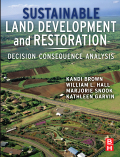Sustainable Land Development and Restoration from Elsevier

Decision Consequence Analysis (DCA) is a framework for improving the quality of decision results. The framework is a systematic, multi-criteria quantification of uncertainties and the opportunities for managing and reducing the potential negative consequences of such uncertainties. DCA is demonstrated throughout the text for each stage of system based management of environmental issues.
DCA links disciplines and incorporates components of risk modelling, probability modelling and the psychology of decision making. Its goal is to provide a comprehensive unbiased decision making framework. Its foundation is accurately defining your problem statement and clearly vetting your objectives to build a structure for meaningful analysis of data. Employment of DCA consistently throughout the environmental industry can reduce decibel-driven, agenda-laden decision making, streamline expenditure of resources (financial, human, natural), and provide a clear path to the sustainable maintenance of balanced environmental systems as the penultimate objective.
Sustainable Land Development and Restoration provides a toolbox to both the novice and experienced environmental practitioner of valuable techniques for addressing site specific environmental issues, as well as managing a portfolio of liabilities on an international scale. Ultimately, the authors are addressing the critical issue of balancing environmental asset balance sheets, whether on the scale of an individual project, across a company's portfolio, or for a community. The environmental manager who adopts the principles in this book will have greater confidence that environmental protection or restoration activities are providing measurable utility. The goal is that, through multidimensional resource management analysis and practices companies and societies can achieve sustainable maintenance of a balanced environmental system.
Descriptions of technical, contracting and implementation processes are supported by detailed case studies to provide real world context rather than an academic exchange of theories.
Key Features
Key geatures of Sustainable Land Development and Restoration include:
- Techniques for addressing site specific environmental issues
- Multidimensional resource management analysis
- Case narrative, data base, and GIS linked
Click here for further information
Terms
While we only use edited and approved content for Azthena
answers, it may on occasions provide incorrect responses.
Please confirm any data provided with the related suppliers or
authors. We do not provide medical advice, if you search for
medical information you must always consult a medical
professional before acting on any information provided.
Your questions, but not your email details will be shared with
OpenAI and retained for 30 days in accordance with their
privacy principles.
Please do not ask questions that use sensitive or confidential
information.
Read the full Terms & Conditions.